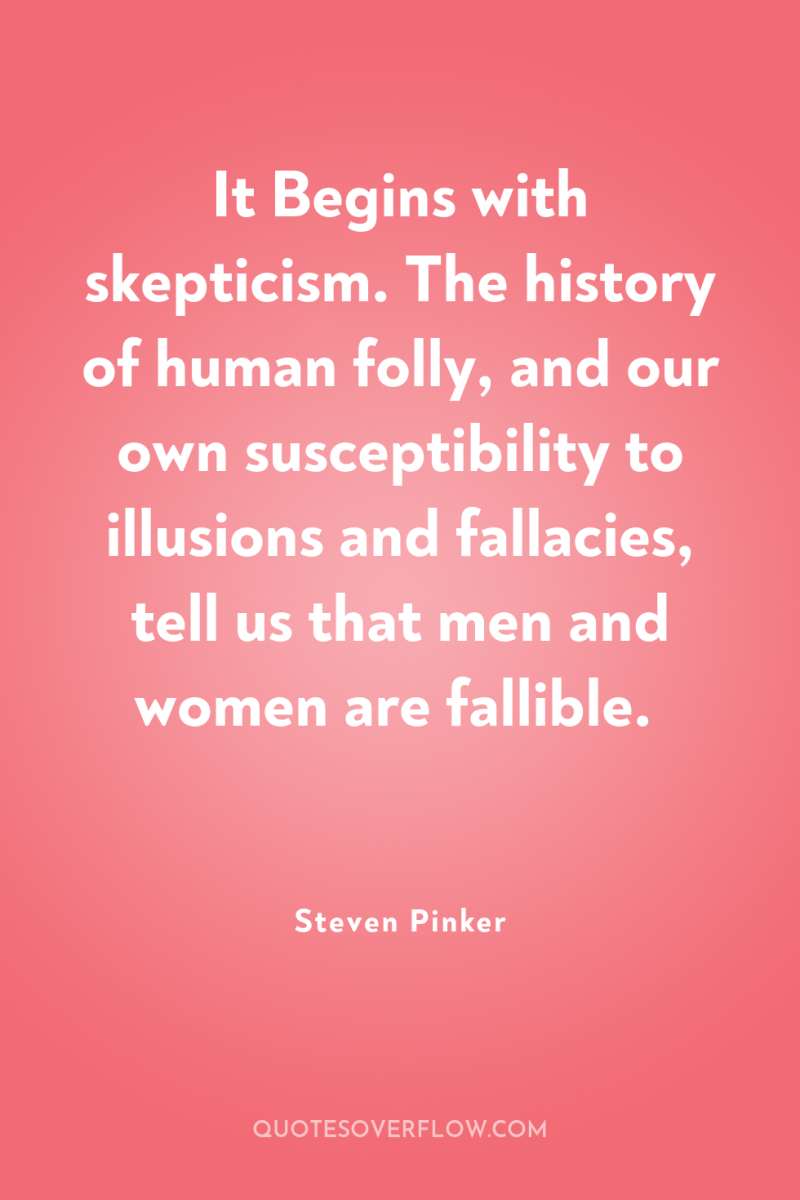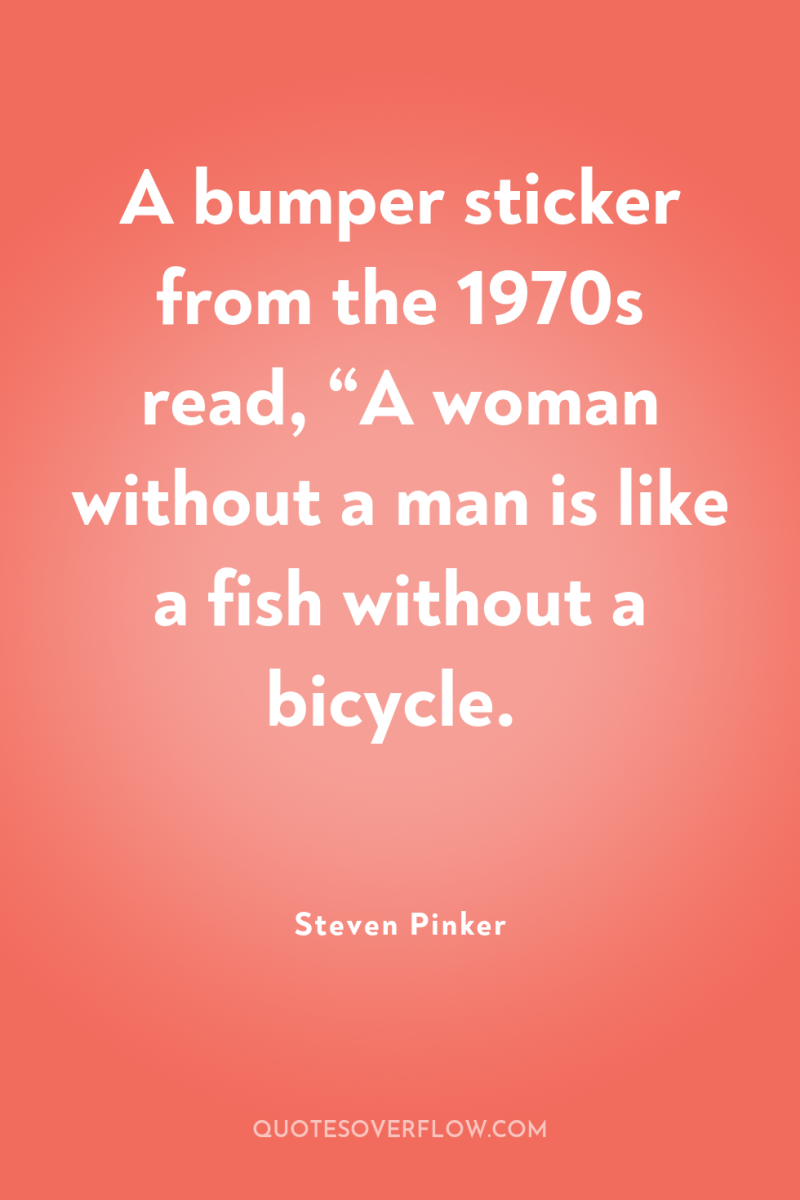1
Trivers, pursuing his theory of the emotions to its logical conclusion, notes that in a world of walking lie detectors the best strategy is to believe your own lies. You can’t leak your hidden intentions if you don’t think they are your intentions. According to his theory of self-deception, the conscious mind sometimes hides the truth from itself the better to hide it from others. But the truth is useful, so it should be registered somewhere in the mind, walled off from the parts that interact with other people. .Steven Pinker
2
The scriptures present a God who delights in genocide, rape, slavery, and the execution of nonconformists, and for millennia those writings were used to rationalize the massacre of infidels, the ownership of women, the beating of children, dominion over animals, and the persecution of heretics and homosexuals. Humanitarian reforms such as the elimination of cruel punishment, the dissemination of empathy-inducing novels, and the abolition of slavery were met with fierce opposition in their time by ecclesiastical authorities and their apologists. The elevation of parochial values to the realm of the sacred is a license to dismiss other people’s interests, and an imperative to reject the possibility of compromise.Steven Pinker
3
Challenge a person's beliefs, and you challenge his dignity, standing, and power. And when those beliefs are based on nothing but faith, they are chronically fragile. No one gets upset about the belief that rocks fall down as opposed to up, because all sane people can see it with their own eyes. Not so for the belief that babies are born with original sin or that God exists in three persons or that Ali is the second-most divinely inspired man after Muhammad. When people organize their lives around these beliefs, and then learn of other people who seem to be doing just fine without them--or worse, who credibly rebut them--they are in danger of looking like fools. Since one cannot defend a belief based on faith by persuading skeptics it is true, the faithful are apt to react to unbelief with rage, and may try to eliminate that affront to everything that makes their lives meaningful.Steven Pinker

4
We will never have a perfect world, but it’s not romantic or naïve to work toward a better one.Steven Pinker
5
Science is thus a paradigm for how we ought to gain knowledge–not the particular methods or institutions of science but its value system, namely to seek to explain the world, to evaluate candidate explanations objectively, and to be cognizant of the tentativeness and uncertainty of our understanding at any time.Steven Pinker
6
Left to our own devices, we are apt to backslide to our instinctive conceptual ways. This underscores the place of education in a scientifically literate democracy, and even suggests a statement of purpose for it (a surprisingly elusive principle in higher education today). The goal of education is to make up for the shortcomings in our instinctive ways of thinking about the physical and social world. And education is likely to succeed not by trying to implant abstract statements in empty minds but by taking the mental models that are our standard equipment, applying them to new subjects in selective analogies, and assembling them into new and more sophisticated combinations. .Steven Pinker
7
The obvious cure for the tragic shortcomings of human intuition in a high-tech world is education. And this offers priorities for educational policy: to provide students with the cognitive tools that are most important for grasping the modern world and that are most unlike the cognitive tools they are born with. The perilous fallacies we have seen in this chapter, for example, would give high priority to economics, evolutionary biology, and probability and statistics in any high school or college curriculum. Unfortunately, most curricula have barely changed since medieval times, and are barely changeable because no one wants to be the philistine who seems to be saying that it is unimportant to learn a foreign language, or English literature, or trigonometry, or the classics. But no matter how valuable a subject may be, there are only twenty-four hours in a day, and a decision to teach one subject is also a decision not to teach another one. The question is not whether trigonometry is important, but whether it is more important than statistics; not whether an educated person should know the classics, but whether it is more important for an educated person to know the classics than to know elementary economics. In a world whose complexities are constantly challenging our intuitions, these trade-offs cannot responsibly be avoided. .Steven Pinker
8
Also, even if technocrats provide reasonable estimates of a risk, which itself is an iffy enterprise, they cannot dictate what level of risk people ought to accept. People might object to a nuclear power plant that has a minuscule risk of a meltdown not because they overestimate the risk, but because they feel that the cost of a catastrophe, no matter how remote, are too dreadful. And of course any of these trade-offs may be unacceptable if people perceive that the benefits would go to the wealthy and powerful while they themselves absorb the risks. Nonetheless, understanding the difference between our best science and our ancient ways of thinking can only make our individual and collective decisions better informed. It can help scientists and journalists explain a new technology in the face of the most common misunderstandings. And it can help all of us understand the technology so that we can accept or reject it on grounds that we can justify to ourselves and to others.Steven Pinker
9
Because much of the content of education is not cognitively natural, the process of mastering it may not always be easy and pleasant, notwithstanding the mantra that learning is fun. Children may be innately motivated to make friends, acquire status, hone motor skills, and explore the physical world, but they are not necessarily motivated to adapt their cognitive faculties to unnatural tasks like formal mathematics. A family, peer group, and culture that ascribe high status to school achievement may be needed to give a child the motive to persevere toward effortful feats of learning whose rewards are apparent only over the long term.Steven Pinker
10
Education is neither writing on a blank slate nor allowing the child's nobility to come into flower. Rather, education is a technology that tries to make up for what the human mind is innately bad at. Children don't have to go to school to learn to walk, talk, recognize objects, or remember the personalities of their friends, even though these tasks are much harder than reading, adding, or remembering dates in history. They do have to go to school to learn written language, arithmetic, and science, because those bodies of knowledge and skill were invented too recently for any species-wide knack for them to have evolved. .Steven Pinker
11
When people have different ideas about which of these four modes of interacting applies to a current relationship, the result can range from blank incomprehension to acute discomfort or outright hostility. Think abut a dinner guest offering to pay the host for her meal, a person barking an order to a friend, or an employee helping himself to a shrimp off the boss' plate. Misunderstandings in which one person thinks of a transaction in terms of Equality Matching and another thinks in terms of Market Pricing are even more pervasive and can be even more dangerous. They tap into very different psychologies, one of them intuitive and universal, the other rarefied and learned, and clashes between them have been common in economic history. .Steven Pinker
12
Language-lovers know that there is a word for every fear. Are you afraid of wine? Then you have oenophobia. Tremulous about train travel? You suffer from siderodromophobia. Having misgivings about your mother-in-law is pentheraphobia, and being petrified of peanut butter sticking to the roof of your mouth is arachibutyrophobia. And then there’s Franklin Delano Roosevelt’s affliction, the fear of fear itself, or phobophobia.Steven Pinker
13
It's natural to think that living things must be the handiwork of a designer. But it was also natural to think that the sun went around the earth. Overcoming naive impressions to figure out how things really work is one of humanity's highest calSteven Pinker

14
The mind is a neural computerSteven Pinker

15
Those who cannot remember the past are condemned to compute it.Steven Pinker
16
Many textbooks point out that no animal has evolved wheels and cite the fact as an example of how evolution is often incapable of finding the optimal solution to an engineering problem. But it is not a good example at all. Even if nature could have evolved a moose on wheels, it surely would have opted not to. Wheels are good only in a world with roads and rails. They bog down in any terrain that is soft, slippery, steep, or uneven. Legs are better. Wheels have to roll along an unbroken supporting ridge, but legs can be placed on a series of separate footholds, an extreme example being a ladder. Legs can also be placed to minimize lurching and to step over obstacles. Even today, when it seems as if the world has become a parking lot, only about half of the earth's land is accessible to vehicles with wheels or tracks, but most of the earth's land is accessible to vehicles with feet: animals, the vehicles designed by natural selection.Steven Pinker
17
The task of evolutionary psychology is not to weigh in on human nature, a task better left to others. It is to add the satisfying kind of insight that only science can provide: to connect what we know about human nature with the rest of our knowledge of how the world works, and to explain the largest number of facts with the smallest number of assumptions.Steven Pinker

18
It Begins with skepticism. The history of human folly, and our own susceptibility to illusions and fallacies, tell us that men and women are fallible.Steven Pinker
19
What could be more fundamental to our sense of meaning and purpose than a conception of whether the strivings of the human race over long stretches of time have left us better or worse off? How, in particular, are we to make sense of modernity–of the erosion of family, tribe, tradition, and religion by the forces of individualism, cosmopolitanism, reason, and science?Steven Pinker
20
The unstated premise that nature is nice lies behind many of the objections to the Darwinian theory of human sexuality. Carefree sex is natural and good, it is assumed, so if someone claims that men want it more than women do, it would imply that men are mentally healthy and women neurotic and repressed. That conclusion is unacceptable, so the claim that men want carefree sex more than women do cannot be correct. Similarly, sexual desire is good, so if men rape for sex (rather than to express anger towards women), rape would not be as evil. Rape is evil; therefore the claim that men rape for sex cannot be correct. More generally, what people instinctively like is good, so if people like beauty, beauty would be a sign of worth. Beauty is not a sign of worth, so the claim that people like beauty cannot be correct. These kinds of arguments combine bad biology (nature is nice), bad psychology (the mind is created by society), and bad ethics (what people like is good). Feminism would lose nothing by giving them up.Steven Pinker
21
The Darwinian approach to sex is often attacked as being antifeminist, but that is just wrong. Indeed, the accusation is baffling on the face of it, especially to the many feminist women who have developed and tested the theory. The core of feminism is surely the goal of ending sexual discrimination and exploitation, an ethical and political position that is in no danger of being refuted by any foreseeable scientific theory or discovery.Steven Pinker
22
Some people think that evolutionary psychology claims to have discovered that human nature is selfish and wicked. But they are flattering the researchers and anyone who would claim to have discovered the opposite.Steven Pinker
23
Many people implicitly believe in the Hydraulic Theory of Violence: that humans harbor an inner drive toward aggression (a death instinct or thirst for blood), which builds up inside us and must periodically be discharged. Nothing could be further from a contemporary scientific understanding of the psychology of violence. Aggression is not a single motive, let alone a mounting urge. It is the output of several psychological systems that differ in their environmental triggers, their internal logic, their neurobiological basis, and their social distribution. .Steven Pinker
24
Many people think that the theory of the selfish gene says that “animals try to spread their genes.” That misstates the facts and it misstates the theory. Animals, including most people, know nothing about genetics and care even less. People love their children not because they want to spread their genes (consciously or unconsciously) but because they can’t help it. That love makes them try to keep their children warm, fed, and safe. What is selfish is not the real motives of the person but the metaphorical motives of the genes that built the person. Genes “try” to spread themselves by wiring animals’ brains so the animals love their kin and try to keep warm, fed, and safe.Steven Pinker

25
I think moralistic science is bad for morals and bad for science.Steven Pinker
26
Friendship, like other kinds of altruism, is vulnerable to cheaters, and we have a special name for them: fair-weather friends. These sham friends reap the benefits of associating with a valuable person and mimic signs of warmth in an effort to become valued themselves. But when a little rain falls, they are nowhere in sight.Steven Pinker

27
The psychological components of war have not gone away–dominance, vengeance, callousness, tribalism, groupthink, self-deceptionSteven Pinker

28
Knights do protect ladies, but only to keep them from being abducted by other knights.Steven Pinker
29
During a famine, the father and stepmother of Hansel and Gretel abandon them in a forest so that they will starve to death. The children stumble upon an edible house inhabited by a witch, who imprisons Hansel and fattens him up in preparation for eating him. Fortunately Gretel shoves the witch into a fiery oven, and “the godless witch burned to death in a horrible way.” 41 - Cinderella’s stepsisters, when trying to squeeze into her slippers, take their mother’s advice and cut off a toe or heel to make them fit. Doves notice the blood, and after Cinderella marries the prince, they peck out the stepsisters’ eyes, punishing them “for their wickedness and malice with blindness for the rest of their lives.” Snow White arouses the jealousy of her stepmother, the queen, so the queen orders a hunter to take her into the forest, kill her, and bring back her lungs and liver for the queen to eat. When the queen realizes that Snow White has escaped, she makes three more attempts on her life, two by poison, one by asphyxiation. After the prince has revived her, the queen crashes their wedding, but “iron slippers had already been heated up for her over a fire of coals.. She had to put on the red-hot iron shoes and dance in them until she dropped to the ground dead. .Steven Pinker
30
Matthew White, a self-described atrocitologist who keeps a database with the estimated death tolls of history’s major wars, massacres, and genocides, counts about 1.2 million deaths from mass killing that are specifically enumerated in the Bible. (He excludes the half million casualties in the war between Judah and Israel described in 2 Chronicles 13 because he considersSteven Pinker
31
The foundation of individual rights is the assumption that people have wants and needs and are authorities on what those wants and needs are. If people's stated desires were just some kind of erasable inscription or reprogrammable brainwashing, any atrocity could be justified.Steven Pinker
32
Many criminologists believe that the source of the state’s pacifying effect isn’t just its brute coercive power but the trust it commands among the populace. After all, no state can post an informant in every pub and farmhouse to monitor breaches of the law, and those that try are totalitarian dictatorships that rule by fear, not civilized societies where people coexist through self-control and empathy. A Leviathan can civilize a society only when the citizens feel that its laws, law enforcement, and other social arrangements are legitimate, so that they don’t fall back on their worst impulses as soon as Leviathan’s back is turned.Steven Pinker

33
A bumper sticker from the 1970s read, “A woman without a man is like a fish without a bicycle.Steven Pinker
34
The researchers argued that an orderly environment fosters a sense of responsibility not so much by deterrence (since Groningen police rarely penalize litterers) as by the signaling of a social norm: This is the kind of place where people obey the rules.Steven Pinker

35
The supposedly immaterial soul, we now know, can be bisected with a knife, altered by chemicals, started or stopped by electricity, and extinguished by a sharp blow or by insufficient oxygen.Steven Pinker
36
Cademics and intellectuals are culture vultures. In a gathering of today’s elite, it is perfectly acceptable to laugh that you barely passed Physics for Poets and Rocks for Jocks and have remained ignorant of science ever since, despite the obvious importance of scientific literacy to informed choices about personal health and public policy. But saying that you have never heard of James Joyce or that you tried listening to Mozart once but prefer Andrew Lloyd Webber is as shocking as blowing your nose on your sleeve or announcing that you employ children in your sweatshop, despite the obvious unimportance of your tastes in leisure-time activity to just about anything.Steven Pinker
37
Computation has finally demystified mentalistic terms. Beliefs are inscriptions in memory, desires are goal inscriptions, thinking is computation, perceptions are inscriptions triggered by sensors, trying is executing operations triggered by a goal.Steven Pinker
38
The collapse of communism and a recognition of its economic and humanitarian catastrophes took the romance out of revolutionary violence and cast doubt on the wisdom of redistributing wealth at the point of a gun.Steven Pinker
39
One of the tragic ironies of the second half of the 20th century is that when colonies in the developing world freed themselves from European rule, they often slid back into warfare, this time intensified by modern weaponry, organized militias, and the freedom of young men to defy tribal elders.77 As we shall see in the next chapter, this development is a countercurrent to the historical decline of violence, but it is also a demonstration of the role of Leviathans in propelling the decline.Steven Pinker
40
Some biblical scholars believe that the story of the fall from the Garden of Eden was a cultural memory of the transition from foraging to agriculture: “In the sweat of thy face shalt thou eat bread.” 79 So why did our foraging ancestors leave Eden? For many, it was never an explicit choice: they had multiplied themselves into a Malthusian trap in which the fat of the land could no longer support them, and they had to grow their food themselves. The states emerged only later, and the foragers who lived at their frontiers could either be absorbed into them or hold out in their old way of life. For those who had the choice, Eden may have been just too dangerous. A few cavities, the odd abscess, and a couple of inches in height were a small price to pay for a fivefold better chance of not getting speared.Steven Pinker
41
So holding many factors constant, we find that living in a civilization reduces one’s chances of being a victim of violence fivefold.Steven Pinker
42
Positive legacy of the 1960s was the revolutions in civil rights, women’s rights, children’s rights, and gay rights, which began to consolidate power in the 1990s as the baby boomers became the establishment. Their targeting of rape, battering, hate crimes, gay-bashing, and child abuse reframed law-and-order from a reactionary cause to a progressive one, and their efforts to make the home, workplace, schools, and streets safer for vulnerable groups (as in the feminist “Take Back the Night” protests) made these environments safer for everyone.Steven Pinker
43
In the foreign country, we call the past, crucifixion was a common punishment. It was invented by the Persians, carried back to Europe by Alexander the Great, and widely used in Mediterranean empires.Steven Pinker
44
In allowing the crucifixion to take place, God did the world an incalculable favor. Though infinitely powerful, compassionate, and wise, he could think of no other way to reprieve humanity from punishment for its sins (in particular, for the sin of being descended from a couple who had disobeyed him) than to allow an innocent man (his son no less) to be impaled through the limbs and slowly suffocate in agony. By acknowledging that this sadistic murder was a gift of divine mercy, people could earn eternal life. And if they failed to see the logic in all this, their flesh would be seared by fire for all eternity. .Steven Pinker
45
What is truly arresting about our kind is better captured in the story of the Tower of Babel, in which humanity, speaking a single language, came so close to reaching heaven that God himself felt threatened.Steven Pinker
46
Apes have a wide variety of sexual arrangements. That means, by the way, that there is no such thing as an “ape legacy” that humans are doomed to live by.Steven Pinker
47
Even evolutionary explanations of the traditional division of labor by sex do not imply that it is unchangeable, “natural” in the sense of good, or something that should be forced on individual women or men who don’t want it.Steven Pinker
48
As technology accumulates and people in more parts of the planet become interdependent, the hatred between them tends to decrease, for the simple reason that you can't kill someone and trade with him too.Steven Pinker
49
Instead of asking, “Why is there war?” we might ask, “Why is there peace?” We can obsess not just over what we have been doing wrong but also over what we have been doing right. Because we have been doing something right, and it would be good to know what, exactly, it is.Steven Pinker
50
The main reason that violence correlates with low socioeconomic status today is that the elites and the middle class pursue justice with the legal system while the lower classes resort to what scholars of violence call “self-help.Steven Pinker
51
Thinking is computation, I claim, but that does not mean that the computer is a good metaphor for the mind. The mind is a set of modules, but the modules are not encapsulated boxes or circumscribed swatches on the surface of the brain. The organization of our mental modules comes from our genetic program, but that does not mean that there is a gene for every trait or that learning is less important than we used to think. The mind is an adaptation designed by natural selection, but that does not mean that everything we think, feel, and do is biologically adaptive. We evolved from apes, but that does not mean we have the same minds as apes. And the ultimate goal of natural selection is to propagate genes, but that does not mean that the ultimate goal of people is to propagate genes.Steven Pinker
52
Perhaps we should rejoice that people’s emotions aren’t designed for the good of the group. Often the best way to benefit one’s group is to displace, subjugate, or annihilate the group next door. Ants in a colony are closely related, and each is a paragon of unselfishness. That’s why ants are one of the few kinds of animal that wage war and take slaves. When human leaders have manipulated or coerced people into submerging their interests into the group’s, the outcomes are some of the history’s worst atrocities.Steven Pinker
53
Plato said that we are trapped inside a cave and know the world only through the shadows it casts on the wall. The skull is our cave, and mental representations are the shadows.Steven Pinker
54
A...reason we are so-so scientists is that our brains were shaped for fitness, not for truth. Sometimes truth is adaptive, but sometimes it is not.Steven Pinker
55
The mind is not designed to grasp the laws of probability, even though the laws rule the universe.Steven Pinker
56
The goal of argumentation is to make a case so forceful (note the metaphor) that skeptics are coerced into believing it–they are powerless to deny it while still claiming to be rational. In principle, it is the ideas themselves that are, as we say, compelling, but their champions are not always averse to helping the ideas along with tactics of verbal dominance, among them intimidation (“Clearly . . .”), threat (“It would be unscientific to . . .”), authority (“As Popper showed . . .”), insult (“This work lacks the necessary rigor for . . .”), and belittling (“Few people today seriously believe that . . .”). Perhaps this is why H. L. Mencken wrote that “college football would be more interesting if the faculty played instead of the students.Steven Pinker
57
Sex and excretion are reminders that anyone's claim to round-the-clock dignity is tenuous. The so-called rational animal has a desperate drive to pair up and moan and writhe.Steven Pinker
58
The idea that boys want to sleep with their mothers strikes most men as the silliest thing they have ever heard. Obviously, it did not seem so to Freud, who wrote that as a boy he once had an erotic reaction to watching his mother dressing. But Freud had a wet-nurse, and may not have experienced the early intimacy that would have tipped off his perceptual system that Mrs. Freud was his mother. The Westermarck theory has out- Freuded Freud.Steven Pinker
59
Since violence is largely a male pastime, cultures that empower women tend to move away from the glorification of violence and are less likely to breed dangerous subcultures of rootless young men.Steven Pinker
60
Feminism as a movement for political and social equity is important, but feminism as an academic clique committed to eccentric doctrines about human nature is not. Eliminating discrimination against women is important, but believing that women and men are born with indistinguishable minds is not. Freedom of choice is important, but ensuring that women make up exactly 50 percent of all professions is not. And eliminating sexual assaults is important, but advancing the theory that rapists are doing their part in a vast male conspiracy is not. .Steven Pinker
61
I believe that the rape-is-not-about-sex doctrine will go down in history as an example of extraordinary popular delusions and the madness of crowds. It is preposterous on the face of it, does not deserve its sanctity, is contradicted by a mass of evidence, and is getting in the way of the only morally relevant goal surrounding rape, the effort to stamp it out.Steven Pinker
62
A sense of solidarity among fifteen-to-thirty-year-olds would be a menace to civilized society even in the best of times.Steven Pinker
63
A society is an organic system that develops spontaneously, governed by myriad interactions and adjustments that no human mind can pretend to understand. Just because we cannot capture its workings in verbal propositions does not mean it should be scrapped and reinvented according to the fashionable theories of the day. Such ham-fisted tinkering will only lead to unintended consequences, culminating in violent chaos.Steven Pinker
64
Nature is a hanging judge, " goes an old saying. Many tragedies come from our physical and cognitive makeup. Our bodies are extraordinarily improbable arrangements of matter, with many ways for things to go wrong and only a few ways for things to go right. We are certain to die, and smart enough to know it. Our minds are adapted to a world that no longer exists, prone to misunderstandings correctable only by arduous education, and condemned to perplexity about the deepest questions we can ascertain.Steven Pinker
65
By exploring the political and moral colorings of discoveries about what makes us tick, we can have a more honest science and a less fearful intellectual milieu.Steven Pinker
66
Evolution is central to the understanding of life, including human life. Like all living things, we are outcomes of natural selection; we got here because we inherited traits that allowed our ancestors to survive, find mates, and reproduce. This momentous fact explains our deepest strivings: why having a thankless child is sharper than a serpent's tooth, why it is a truth universally acknowledged that a single man in possession of a good fortune must be in want of a wife, why we do not go gentle into that good night but rage, rage against the dying of the light .Steven Pinker
67
Behavioral science is not for sissies.Steven Pinker
68
Nothing invests life with more meaning than the realisation that every moment of sentience is a precious giftSteven Pinker
69
The one great universal in the study of violence is that most of it is committed by fifteen-to-thirty-year-old men.Steven Pinker
70
More to the point, what was the lesson that the first Christians drew from crucifixion? Today such a barbarity might galvanize people into opposing brutal regimes, or demanding that such torture never again be inflicted on a living creature. But those weren´t the lessons the early Christians drew at all. No, the execution of Jesus is The Good News, a necessary step in the most wonderful episode in history. In allowing the crucifixion to take place, God did the world an incalculable favor. Though infinitely powerful, compassionate, and wise, he could think of no other way to reprieve humanity from punishment for its sins (in particular, for the sin of being descended from a couple who had disobeyed him) that to allow, an innocent man (his son no less) to be impaled through the limbs and slowly suffocate in agony. By acknowledging that this sadistic murder was a gift of divine mercy, people could earn eternal life. And if they failed to see the logic in all this, their flesh would be seared by fire for all eternity. .Steven Pinker
71
Perhaps the most extraordinary popular delusion about violence of the past quarter-century is that it is caused by low self-esteem. That theory has been endorsed by dozens of prominent experts, has inspired school programs designed to get kids to feel better about themselves, and in the late 1980s led the California legislature to form a Task Force to Promote Self-Esteem. Yet Baumeister has shown that the theory could not be more spectacularly, hilariously, achingly wrong. Violence is a problem not of too little self-esteem but of too much, particularly when it is unearned. .Steven Pinker
72
As many political writers have pointed out, commitment to political equality is not an empirical claim that people are clones.Steven Pinker
73
Once we have isolated the computational and neurological correlates of access-consciousness, there is nothing left to explain. It's just irrational to insist that sentience remains unexplained after all the manifestations of sentience have been accounted for, just because the computations don't have anything sentient in them. It's like insisting that wetness remains unexplained even after all the manifestations of wetness have been accounted for, because moving molecules aren't wet.Steven Pinker
74
Sometimes it is not easy to find any words that properly convey a thought. When we hear or read, we usually remember the gist, not the exact words, so there has to be such a thing as a gist that is not the same as a bunch of words.Steven Pinker
75
As with any form of mental self-improvement, you must learn to turn your gaze inward, concentrate on processes that usually run automatically, and try to wrest control of them so that you can apply them more mindfully.Steven Pinker
76
Why do we say razzle-dazzle instead of dazzle-razzle? Why super-duper, helter-skelter, harum-scarum, hocus-pocus, willy-nilly, hully-gully, roly-poly, holy moly, herky-jerky, walkie-talkie, namby-pamby, mumbo-jumbo, loosey-goosey, wing-ding, wham-bam, hobnob, razza-matazz, and rub-a-dub-dub? I thought you'd never ask. Consonants differ in "obstruency"–the degree to which they impede the flow of air, ranging from merely making it resonate, to forcing it noisily past an obstruction, to stopping it up altogether. The word beginning with the less obstruent consonant always comes before the word beginning with the more obstruent consonant. Why ask why?.Steven Pinker
77
The difference between bush and ladder also allows us to put a lid on a fruitless and boring debate. That debate is over what qualifies as True Language. One side lists some qualities that human language has but that no animal has yet demonstrated: reference, use of symbols displaced of in time and space from their referents, creativity, categorical speech perception, consistent ordering, hierarchical structure, infinity, recursion, and so on. The other side finds some counter-example in the animal kingdom (perhaps budgies can discriminate speech sounds, or dolphins or parrots can attend to word order when carrying out commands, or some songbird can improvise indefinitely without repeating itself), and gloats that the citadel of human uniqueness has been breached. The Human Uniqueness team relinquishes that criterion but emphasizes others or adds new ones to the list, provoking angry objections that they are moving the goalposts. To see how silly this all is, imagine a debate over whether flatworms have True Vision or houseflies have True Hands. Is an iris critical? Eyelashes? Fingernails? Who cares? This is a debate for dictionary-writers, not scientists. Plato and Diogenes were not doing biology when Plato defined man as a "featherless biped" and Diogenes refuted him with a plucked chicken.Steven Pinker
78
The audible signals people can produce are not a series of crisp beeps like on a touch-tone phone. Speech is a river of breath, bent into hisses and hums by the soft flesh of the mouth and throat.Steven Pinker
79
And at the risk of sounding like Andy Rooney on Sixty Minutes, have you ever wondered why we say fiddle-faddle and not faddle- fiddle? Why is it ping-pong and pitter-patter rather than pong-ping and patter-pitter? Why dribs and drabs, rather than vice versa? Why can't a kitchen be span and spic? Whence riff-raff, mish-mash, flim-flam, chit-chat, tit for tat, knick-knack, zig-zag, sing-song, ding-dong, King Kong, criss-cross, shilly-shally, see-saw, hee-haw, flip-flop, hippity-hop, tick-tock, tic-tac-toe, eeny-meeny-miney-moe, bric-a-brac, clickety-clack, hickory-dickory-dock, kit and kaboodle, and bibbity-bobbity-boo? The answer is that the vowels for which the tongue is high and in the front always come before the vowels for which the tongue is low and in the back.Steven Pinker
80
When it comes to correct English, there's no one in charge; the lunatics are running the asylum.Steven Pinker
81
I think about how language works so I can best explain how language works.Steven Pinker
82
Humans are so innately hardwired for language that they can no more suppress their ability to learn and use language than they can suppress the instinct to pull a hand back from a hot surface.Steven Pinker
83
The essence of a culture of honor is that it does not sanction predatory or instrumental violence, but only retaliation after an insult or other mistreatment.Steven Pinker
84
The universality of reason is a momentous realization, because it defines a place for morality. If I appeal to you do do something that affects me–to get off my foot, or not to stab me for the fun of it, or to save my child from drowning–then I can't do it in a way that privileges my interests of yours if I want you to take me seriously (say, by retaining my right to stand on your foot, or to stab you, or to let your children drown). I have to state my case in a way that would force me to treat you in kind. I can't act as if my interests are special just because I'm me and you're not, any more than I can persuade you that the spot I am standing on is a special place in the universe just because I happen to be standing on it. You and I ought to reach this moral understanding not just so we can have a logically consistent conversation but because mutual unselfishness is the only way we can simultaneously pursue our interests. You and I are both better off if we share our surpluses, rescue each other's children when they get into trouble, and refrain from knifing each other than we would be if we hoarded our surpluses while they rotted, let each other's children drown, and feuded incessantly. Granted, I might be a bit better off if I acted selfishly at your expense and you played the sucker, but the same is true for you with me, so if each of us tried for these advantages, we'd both end up worse off. Any neutral observer, and you and I if we could talk it over rationally, would have to conclude that the state we should aim for is the one where we both are unselfish. Morality, then, is not a set of arbitrary regulations dictated by a vengeful deity and written down in a book; nor is it the custom of a particular culture or tribe. It is a consequence of the interchangeability of perspectives and the opportunity the world provides for positive-sum games. .Steven Pinker
85
Religious people today, compartmentalize their attitude to the Bible. They pay it lip service as a symbol of morality while getting their actual morality from more modern principles.Steven Pinker
86
If the metaphors in everyday speech are a clue, then all of us associate blankness with virtue rather than with nothingness. Think of the moral connotations of the adjectives: clean, fair, immaculate, lily-white, pure, spotless, unmarred and unsullied.Steven Pinker
87
Institutionalized torture in Christendom was not just an unthinking habit; it had a moral rationale. If you really believe that failing to accept Jesus as one's savior is a ticket to fiery damnation, then torturing a person until he acknowledges this truth is doing him the biggest favor of his life: better a few hours now than an eternity later.Steven Pinker
88
No society can be simultaneously fair, free, and equal. If it is fair, people who work harder can accumulate more. If it is free, people will give their wealth to their children. But then it cannot be equal, for some people will inherit wealth they did not earn.Steven Pinker
89
They are distinct enough that our crude instruments can pick up the differences, yet both are healthy instances of that staggeringly improbable, exquisitely engineered system we call a human being.Steven Pinker
90
The Bible depicts a world that, seen through modern eyes, is staggering in its savagery. People enslave, rape, and murder members of their immediate families. Warlords slaughter civilians indiscriminately, including the children. Women are bought, sold, and plundered like sex toys. And Yahweh tortures and massacres people by the hundreds of thousands for trivial disobedience or for no reason at all. These atrocities are neither isolated nor obscure. They implicate all the major characters of the Old Testament, the ones that Sunday-school children draw with crayons. And they fall into a continuous plotline that stretches for millennia, from Adam and Eve through Noah, the patriarchs, Moses, Joshua, the judges, Saul, David, Solomon, and beyond.Steven Pinker
91
States are far less violent than traditional bands and tribes. Modern Western countries, even in their most war-torn centuries, suffered no more than around a quarter of the average death rate of nonstate societies, and less than a tenth of that for the most violent one.Steven Pinker
92
As an Auyana man living in New Guinea under the Pax Australiana put it, “Life was better since the government came” because “a man could now eat without looking over his shoulder and could leave his house in the morning to urinate without fear of being shot.Steven Pinker
93
Some people think that evolutionary psychology claims to have discovered that human nature is selfish and wicked. But they are flattering the researchers and anyone who would claim to have discovered the opposite. No one needs a scientist to measure whether humans are prone to knavery. The question has been answered in the history books, the newspapers, the ethnographic record, and the letters to Ann Landers. But people treat it like an open question, as if someday science might discover that it's all a bad dream and we will wake up to find that it is human nature to love one another.Steven Pinker
94
Many artists and scholars have pointed out that ultimately art depends on human nature.Steven Pinker
95
We should expose whatever ends are harmful and whatever ideas are false, and not confuse the two.Steven Pinker
96
Evolutionarily speaking, there is seldom any mystery in why we seek the goals we seek – why, for example, people would rather make love with an attractive partner than get a slap on the belly with a wet fish.Steven Pinker
97
It looks as if the offspring have eyes so that they can see well (bad, teleological, backward causation), but that's an illusion. The offspring have eyes because their parents' eyes did see well (good, ordinary, forward causation).Steven Pinker
98
Today we recognize that the emotion of disgust evolved as an unconscious defense against biological contamination.Steven Pinker
99
A design can excel at one challenge only by compromising at others.Steven Pinker
100
George Williams, the revered evolutionary biologist, describes the natural world as “grossly immoral.” Having no foresight or compassion, natural selection “can honestly be described as a process for maximizing short-sighted selfishness.” On top of all the miseries inflicted by predators and parasites, the members of a species show no pity to their own kind. Infanticide, siblicide, and rape can be observed in many kinds of animals; infidelity is common even in so-called pair-bonded species; cannibalism can be expected in all species that are not strict vegetarians; death from fighting is more common in most animal species than it is in the most violent American cities. Commenting on how biologists used to describe the killing of starving deer by mountain lions as an act of mercy, Williams wrote: “The simple facts are that both predation and starvation are painful prospects for deer, and that the lion's lot is no more enviable. Perhaps biology would have been able to mature more rapidly in a culture not dominated by Judeo-Christian theology and the Romantic tradition. It might have been well served by the First Holy Truth from [Buddha's] Sermon at Benares: “Birth is painful, old age is painful, sickness is painful, death is painful..”” As soon as we recognize that there is nothing morally commendable about the products of evolution, we can describe human psychology honestly, without the fear that identifying a “natural” trait is the same as condoning it. As Katharine Hepburn says to Humphrey Bogart in The African Queen, “Nature, Mr. Allnut, is what we are put in this world to rise above. .Steven Pinker